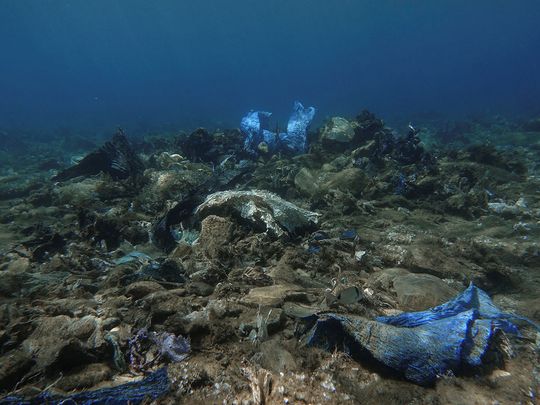Ottawa: Negotiators from 175 countries will meet in Canada starting Tuesday to hammer out a binding global treaty to end plastic pollution. Many sticking points need to be resolved five months after the last round of talks in Kenya.
In 2022, nations agreed to conclude a world-first U.N. treaty by the end of this year to combat the scourge of plastics, which are found everywhere from mountain peaks to the depths of the ocean, as well as in human blood and breast milk .
Get exclusive content with Gulf News WhatsApp channel
Negotiators have already met three times and are expected to hold a final round of negotiations in South Korea after the Ottawa talks.
The most recent meeting in Nairobi last November provided the first opportunity to discuss a draft treaty setting out ways to resolve the problem. It ended with disagreements over its scope and environmental NGOs decrying a lack of concrete progress.
“We have a text, it is a basis, although there is still a lot of work to be done on it,” Canadian Environment Minister Steven Guilbeault, host of the Ottawa talks, told AFP.
According to him, the aim of this round is “to reach a text in which 60 to 70 percent of the elements are approved by the delegates meeting by April 29.”
The stakes are high as widespread plastic pollution has potentially serious impacts on the oceans and climate.
Although there is broad consensus on the need for a treaty, environmental activists calling for a 75 percent reduction in plastic production by 2040 are at odds with oil-producing countries and the plastics industry itself, which support recycling.
“Weakened agreement”
“This treaty represents a tremendous opportunity at a time of urgency,” said marine scientist Neil Nathan of the University of California Santa Barbara. “Legally binding and concrete measures are necessary to avoid a watered-down agreement that is no longer in keeping with the times.”
Annual plastic production has more than doubled to 460 million tons in 20 years and is on track to triple within four decades.
Only 9 percent is recycled, and according to the OECD, its contribution to global warming could more than double by 2060 – after accounting for 3.4 percent of global emissions in 2019.
“We are at a crossroads,” said Eirik Lindebjerg of World Wildlife Fund International. He noted that “an overwhelming majority of countries have already called for the adoption of the necessary binding global rules – our leaders must now turn these calls into action.”
The NGO Ocean Conservancy believes that the talks in Ottawa will be a signal as to whether or not an agreement can be reached by the end of the year.
The Tara Ocean Foundation pointed out that the text of the draft had grown from 31 to 70 pages, a sign that key provisions of the treaty “are not yet defined” and that negotiators are being forced to cover all options.
Countries, including France, are calling for the creation of intersessional working groups to address outstanding issues, in particular: identifying which plastic products are problematic and avoidable, which polymers and substances should be banned and establishing eco-design criteria.
Several North American organizations recently called on President Joe Biden to become more involved on the issue.
Anja Brandon of Ocean Conservancy said: “The United States is the largest producer of plastic waste in the world, both per capita and overall by volume or absolute weight.”
It joins China, Saudi Arabia and OPEC members among countries reluctant to consider reducing production.
According to Chris Jahn of the International Council of Chemical Associations, manufacturers insist they are bringing solutions and expertise to the conversation and are “innovating, investing and advancing smart policies to help end plastic pollution.”
At the same time, he warned of the “far-reaching consequences that limiting plastic production would have for society” and called for a more gradual approach.
Other countries are calling for ambitious measures, particularly 65 members of a so-called “ambitious” coalition chaired by Rwanda and Norway, which includes most European Union countries.
















